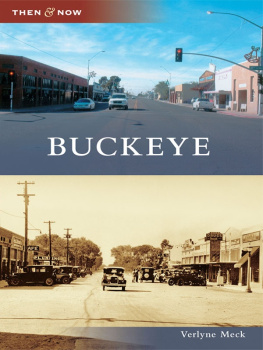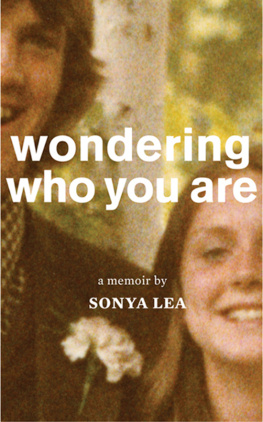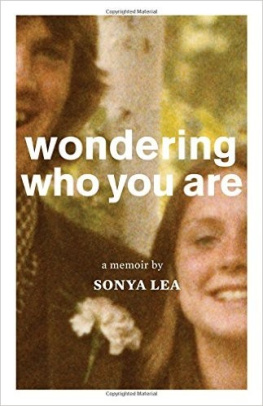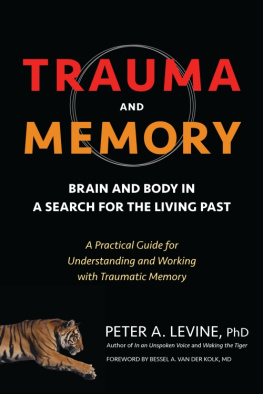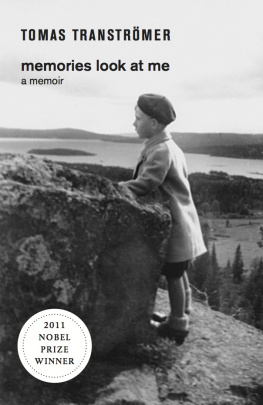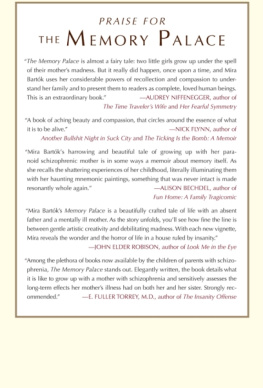Thank you for downloading this Simon & Schuster eBook.
Join our mailing list and get updates on new releases, deals, bonus content and other great books from Simon & Schuster. CLICK HERE TO SIGN UP or visit us online to sign up at
eBookNews.SimonandSchuster.com

To Mom and Dad for giving me life To Benjamin, Patrick, and Kassidy for patiently teaching me about life and guiding me so lovingly through life To Jim for enabling me, even encouraging me, to share with the world so much about this, our crazy life I sincerely hope some good can come from all of this, especially for those with TBI, their families, and their friends.

These Are the Days of Our Lives
Queen
I never had aspirations as a writer. But here I am, writing. I was a difficult child. But evidently I wasnt all that different from most other children growing up in the 1960s and 70s. I lacked motivation in school. And yet report cards show me to be an excellent student. I got drunk a lot as a teenager but I have never tasted alcohol. I have no idea what falling in love feels like, and yet I have been married for almost thirty years.
These examples are just a small sampling of the many inconsistencies that make up my life as I know it. Actually, my lives. I have at least two of them. My first life began when I was born in the summer of 1965 and progressed through until the spring of 1988. I do not have any genuine memories from any of this first life. Then there is the life I mostly remember living since roughly 1991 or 1992. But I have discovered recently that I have several other lives as well. Because I depend solely on the stories of others to fill in decades of living, anecdotes about who I was, what I did, and how I lived, I have found that my life story varies depending on whom I talk to. And a lot of the time, accounts of a certain event dont just differ but totally contradict each other.
I had no idea how much this life of mine would transform when I first began telling my story. After Daniel de Viss article about me appeared in the Sunday edition of the Washington Post, on May 21, 2011, suddenly my family and I were big news. I became kind of a poster child for traumatic brain injury (TBI). People wanted to interview me on both radio and television. I received hundreds of e-mails from people living all over the world relating their own struggles living with TBI, and telling me that my story gave them hope.
Literary agents began contacting me asking if I would be willing to write a memoir, and at first the thought of writing a book seemed preposterous to me. But as I read about the hopes, as well as the frustrations, of other people who were reaching out to me, it suddenly dawned on me that maybe telling my story could help get the word out about what it is like to live in an often confusing world, made even more confusing because of a baffling brain injury.
However, if I agreed to write my story, I wanted to make sure that I would be able to tell the whole sordid tale, not only with my familys permission but with their blessing as well. This story is not some kind of fairy tale that begins with once upon a time and ends with and everyone lived happily ever after. I wanted to write truth. And thats when it began to get tricky. As my husband, Jim, and I like to say, the whole thing was a mission fraught with peril. How is someone like me, with no memories of at least the first twentysomething years of her life, supposed to write a memoir? And how are friends and family in the year 2013 supposed to remember exactly what I was like and what I was doing in 1965? 1972? 1980? How are those same friends and family members supposed to remember what exactly happened on a Sunday afternoon in May of 1988?
With the help of Daniel de Vis, I was able to track down my medical records from the hospital in Fort Worth, Texas. Dan agreed to undertake the job of researcher, investigating some of the medical breakthroughs that have been made in the science of the brain since the 1980s, as well as brain conditions that continue to baffle the medical community. He then sifted through all of those details and made an attempt to explain them to me. In addition, I have spoken with many people who knew me as I was growing up. I have had long conversations with my parents and siblings, as well as other close family members and friends.
It is difficult for me to be so unbelievably dependent on stories about myself from other people as I try to get to the truth about my life. Part of me realizes that I will never really know exactly what I was like before my head injury or understand why I am the way I am now. But another part of me stubbornly refuses to give up as I try desperately to fit pieces together in an ever-changing life-size puzzle.

Life in the Fast Lane
The Eagles
I dont remember any of what Im about to tell you. Sure, I know the story, but it is just a story related to me by others, in bits and pieces, over many years. I have attempted to collect those scraps in order to present a narrative that feels real and whole. But it has been difficult. I have had to interpret the story, to picture the scenes in my mind, just as you are about to do. Some of the pieces are missing, because the people who witnessed them have forgotten the details, or because the people have themselves disappeared. Part of what continues to be maddening for me is the number of questions I still have that nobody seems to be able to answer in any kind of satisfactory way. Imagine the defining day of your life, stitched together from other peoples memories.
This story starts on May 22, 1988. It is important to appreciate that what happened on that day was quite literally life changing for many people. Not just me. As I write about what transpired, I will rely chiefly on the memories of my husband, Jim, the only living soul who was present on that day and can recount what happened. Or at least how he remembers it happening. I was there, too, of course, but my memories are lost. My two sons were there, but they were too young to remember what took place that day.
This was the day that my old life ended and my new life began. I died, in a way, and was reborn, with the same physical form, but not the same mind. My body still knew how to do a few of the things I had taught it to do, like play the drums and ride a bicycle. But thats where the similarities end. The two Sus have lived separate lives. She never knew me, and I know nothing of her except what people have told me. She rebelled; I conform. She broke rules; I follow them. She drank and smoked pot; I dont even know the taste of beer or wine, and the smell of smoke makes me physically ill. I like vegetables; she hated them. She loved to swim; I am absolutely terrified of the water.
I still to this day sit around with my family and listen to stories about the other Su, in the same way that a child might sit and hear of things that happened before she was born. Our family history has two distinct chapters, Before Su and After Su . My husband, being a computer geek, sometimes calls me Su 2.0.
You might wonder how it feels to wake up one morning and not know who you are. I dont know. The accident didnt just wipe out all my memories; it hindered me from making new ones for quite some time. I awoke each day to a house full of strangers. Every morning began with a lesson: Welcome to your new life. And this wasnt just a few days. It was weeks before I recognized my boys when they toddled into the room, months before I knew my own telephone number, years before I was able to find my way home from anywhere. I have no more memory of those first several years after the accident than my own kids have of their first years of life.
Next page
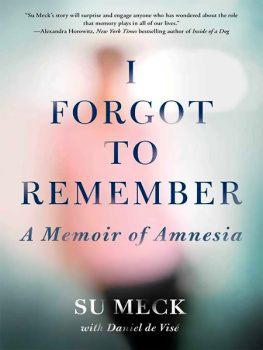
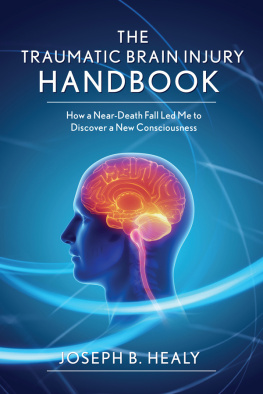

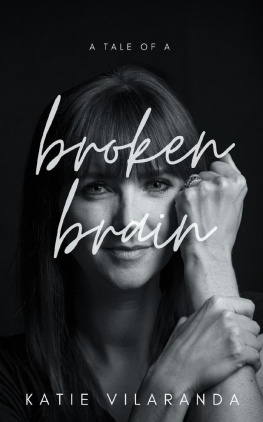
![Bartók Mira - The memory palace: [a memoir]](/uploads/posts/book/250588/thumbs/bart-k-mira-the-memory-palace-a-memoir.jpg)
